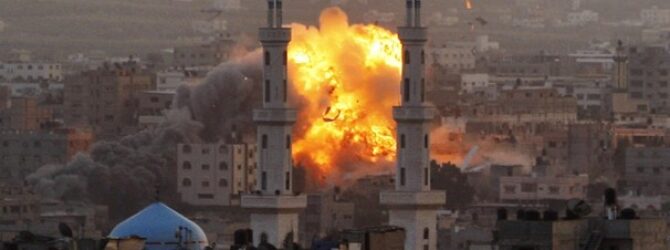
Israel strikes media buildings in Gaza, expanding its range of targets
TEL AVIV — The Israeli military struck two buildings used by journalists in Gaza early Sunday during the fifth day of a campaign against militants in the Palestinian enclave. Hours later, artillery rounds landed in southern Israeli cities and the country’s missile defense system intercepted a powerful long-range rocket over Tel Aviv, the second such incident in as many days.
 Sunday’s strikes in Gaza suggested Israel is continuing to expand its range of targets after hitting almost exclusively military sites during the first few days of the operation, dubbed Pillar of Defense. On Saturday, an Israeli bomb demolished the office of Hamas Prime Minister Ismail Haniyeh. The crossfire dimmed hopes for a cease-fire as Arab leaders led by Egyptian President Mohamed Morsi were set to convene in Cairo on Sunday to discuss a negotiated end to the conflict.
Sunday’s strikes in Gaza suggested Israel is continuing to expand its range of targets after hitting almost exclusively military sites during the first few days of the operation, dubbed Pillar of Defense. On Saturday, an Israeli bomb demolished the office of Hamas Prime Minister Ismail Haniyeh. The crossfire dimmed hopes for a cease-fire as Arab leaders led by Egyptian President Mohamed Morsi were set to convene in Cairo on Sunday to discuss a negotiated end to the conflict.At least five Israelis were wounded in a rocket attack on the city of Ashdod on Saturday, according to a police spokesman. Following those attacks, the military deployed an ‘Iron Dome’ rocket defense battery in central Israel on Saturday.
The Israeli military said the sites struck overnight included a “communications antenna used by Hamas to carry out terrorist activity.” In a statement, it said it also hit dozens of underground rocket launchers and a Hamas training base.
Avital Leibovich, an Israeli military spokeswoman said Sunday that the media buildings struck included key Hamas communication infrastructure.
“The target was not journalists,” she told reporters in Jerusalem. “The journalists in these buildings were serving as human shields for Hamas.”
Leibovich said the prospect of a ground operation remains “on the table,” but that the country’s leaders have not yet decided whether to deploy troops into Gaza.
A nighttime lull in rocket fire from Gaza ended shortly after 8 a.m. as rockets landed in Ashkelon and Eshkol, southern Israeli cities. Around 10:30 a.m., the artillery warning siren in Tel Aviv rang out seconds before a long-range rocket was blasted overhead by the country’s anti-missile system, known as Iron Dome. Local media reported that a vehicle struck by debris caught on fire.
At the start of a three-day trip to Southeast Asia, President Obama said at a news conference in Bangkok on Sunday that Israel has a right to defend itself, the Associated Press reported.
“No country on Earth would tolerate missiles raining down” on its people, Obama said, and a resolution to the conflict “starts with no missiles being fired into Israel’s territory.”